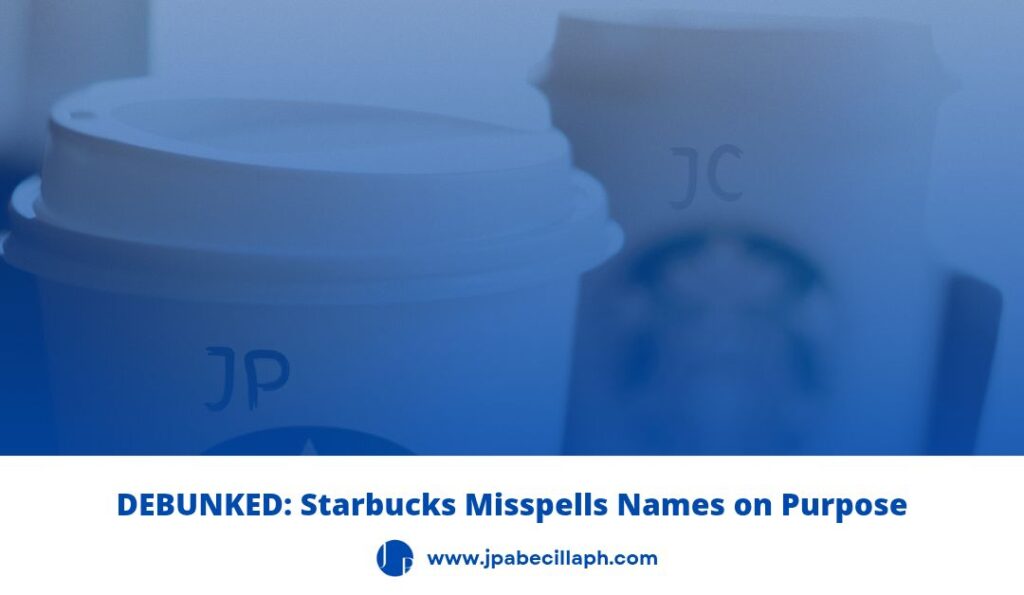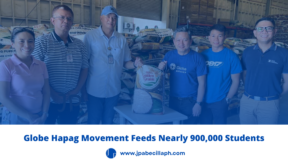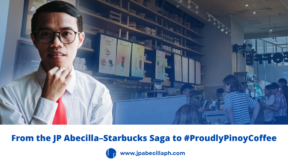Let’s cut through the noise. My viral Facebook post ranting about a barista butchering my name on a Starbucks cup sparked a firestorm of comments, with many claiming Starbucks misspells names deliberately as a marketing strategy.
The theory? Baristas intentionally scribble wrong names to trick customers into posting their cups online, generating free buzz. As a brand strategist and marketing manager myself, I’ve dug into this, and I’m here to tell you: this idea is a MYTH, propped up by speculation and wishful thinking. Let’s dismantle it with facts, including an analysis of its social media impact.

Related Post: From the JP Abecilla–Starbucks Saga to #ProudlyPinoyCoffee: A Journey of Brewing Filipino Pride
The Starbucks Misspelling Names Theory: A House of Cards
The notion that Starbucks misspells names as a marketing ploy took off around 2015, fueled by a viral YouTube video from comedian Paul Gale. The argument goes that misspelled names—like “Brian” becoming “Brain” or my own “JP” turning into “Jade” and “JC”—get people to snap photos, post them on social media, and give Starbucks free advertising. X posts, like one from @zafranmustafa in 2023, called it “top-tier marketing,” claiming it drives customers to share and engage.
It sounds clever, doesn’t it? But clever doesn’t mean true.
Before Gale’s video, an unnamed Starbucks assistant manager told Cosmopolitan in 2014 that they saw name misspellings as a “marketing tool.” Since then, social media and marketing blogs (including a 2023 Medium article) have echoed the theory. But let’s be clear: speculation isn’t evidence, and the facts tell a different story.
Fact #1: Starbucks Officially Denies Intentional Misspellings
Starbucks has been crystal clear: they don’t direct baristas to misspell names. A 2016 spokesperson told BuzzFeed News, “We’ve never asked or directed any of our partners to misspell names of our customers for any reason.”
Again in 2023, they confirmed to Thrillist that misspellings are not a tactic but a result of baristas doing their best in chaotic environments. Writing names is about building a personal connection, not orchestrating a viral campaign. If Starbucks wanted to game social media, they’d have a policy in their training manuals. After checking through available evidence online, no such directive exists.
Fact #2: Human Error, Not Corporate Conspiracy
Starbucks stores are loud, fast, and chaotic. Baristas juggle orders, steaming milk, and shouting names over blaring music and chatter. Mishearing “JP” as “Jade” or “Kaitlyn” as “Caitlin” isn’t a marketing masterplan; it’s human error.
As a brand strategist and marketing manager, I know mistakes happen under pressure. Former baristas on Reddit confirm training focuses on speed, not creative misspelling. My own experience, my name mangled during a dizzy afternoon, proves it’s about human error, not strategy. Or, it might be because the barista is one of those who believe a false assumption that has been around for many years now.
Fact #3: Free Publicity? Sure, But It’s Accidental
Yes, Starbucks misspelling names generates social media buzz, but it’s not intentional. A 2017 Brandwatch analysis found 2,814 X mentions of misspelled names in six weeks, estimating 75,000 since 2012, excluding retweets. Hashtags like #Starbucksnamefail trend because people, like me, share the absurdity. My post alone got 80,000 shares, amplifying Starbucks’ brand despite my frustration.
But correlation isn’t causation.
Intentionally annoying customers risks backlash, especially when names are tied to identity. No smart brand would gamble on that.
Social Media Impact Analysis
The social media impact of Starbucks’ name misspellings is undeniable, but it’s a byproduct, not a strategy. Here’s a breakdown:
- Viral Reach: My June 2025 Facebook post, shared over 80,000 times, shows how one misspelling can explode online. Brandwatch (2017) estimated 75,000 X mentions since 2012, with 2,814 in six weeks alone. If each mention reaches 200 followers, that’s potentially 15 million impressions. Images of cups with the Starbucks logo amplify this—Brandwatch noted nearly double the image-sharing rate for misspelling posts compared to general Starbucks mentions.
- Engagement: Misspellings spark emotional reactions—amusement, frustration, or curiosity—driving shares and comments. My saga became a meme, with “JC” mocked across platforms, and X posts like @tribunephl’s June 2025 coverage fueled debate. Hashtags like #Starbucksnamefail create communities around shared experiences, boosting engagement without Starbucks spending a dime.
- Brand Exposure: Each post, even negative ones like mine, showcases the Starbucks logo, reinforcing brand recall. A 2023 Medium article noted that misspellings turn customers into “brand ambassadors” via user-generated content. But this exposure comes with risks—my post criticized Starbucks, and others, like @Kirsty’s comment on Facebook, downplayed misspellings but highlighted noisy stores.
- Sentiment Risks: While many find misspellings funny, negative sentiment can hurt. My post, tagged “feeling disappointed,” sparked divided reactions—some empathized, others called me “OA.” A 2025 Preview article noted netizens arguing I overreacted, showing how misspellings can alienate customers. Starbucks’ lack of response to these viral moments, as criticized in a 2014 Forbes piece, risks letting negative narratives fester.
The data suggests Starbucks benefits from organic buzz—my post alone gave them massive exposure—but there’s no evidence they orchestrate it. The viral cycle thrives on human nature, not corporate directives. Intentionally misspelling names would be a reckless strategy, risking customer loyalty for fleeting posts, as my switch to Bo’s Coffee shows.
The Real Marketing Lesson
The Starbucks misspelling names myth teaches us that perception can outrun reality. My Facebook post blew up because people love a good conspiracy, but as marketers, we need evidence. Starbucks’ genius lies in personalization—writing names creates a human touch, even if imperfect. Misspellings are a side effect of a busy business, let alone a false assumption about a non-existent marketing strategy, not a secret weapon.
Next time your name’s mangled, you may laugh and snap a pic but don’t buy the conspiracy. Starbucks isn’t that sneaky.
And speaking from experience? It’s frustrating.







